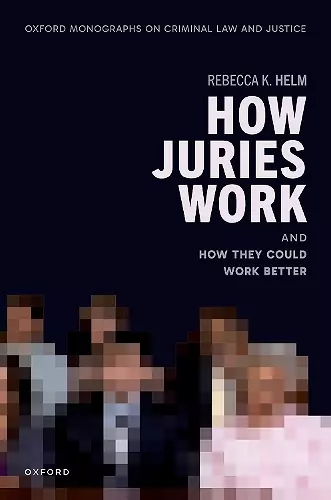How Juries Work
And How They Could Work Better
Format:Hardback
Publisher:Oxford University Press
Published:11th Jul '24
Currently unavailable, and unfortunately no date known when it will be back

The majority of common law jurisdictions, and some civil law jurisdictions, use juries composed of citizens drawn from the general population to deliberate and reach collective verdicts in criminal cases. Juries are relied on to use their collective judgment to reach verdicts that accord with normative legal goals; for example, by being accurate and fair. How Juries Worksuggests that, though important symbolically, the current jury system is not necessarily well designed to meet the demands of modern society, which increasingly requires evidence-based procedure that is carefully designed to achieve normative goals. Rebecca K. Helm proposes new models of how jurors and juries function in practice, informed by psychological theory and empirical research, which provide a framework to interpret and integrate the large body of existing work on jury decision-making. Drawing on this framework, Helm highlights the deficiencies and strengths of the jury as a legal fact-finder, providing key insights into how to minimize deficiencies and maximize strengths through trial procedure. The book concludes with a set of timely evidence-based suggestions as to how procedure surrounding trial by jury might be altered to enhance the administration of justice in the many jurisdictions where the criminal law jury is utilized. How Juries Workintegrates legal and psychological theory and research to present a comprehensive assessment of the modern criminal law jury, and of how evidence-based research can improve jury performance.
How Juries Work offers a thorough and critical examination of the modern jury, challenging deeply rooted assumptions about how juries function and the extent to which tradition-bound practices serve the goals of justice. By drawing on psychological theory, empirical research, and comparative legal analysis, Helm exposes the many limitations inherent in current jury procedures, ranging from cognitive biases and memory errors at the individual level to systemic issues of group dynamics and representativeness. Whether approached by scholars, practitioners, or policymakers, the book serves as both a diagnostic tool and a springboard for future innovation, offering a wealth of insights and practical recommendations that warrant serious consideration and further study. * Annabelle Frazier, Criminal Law and Criminal Justice Books *
ISBN: 9780192857293
Dimensions: 240mm x 165mm x 20mm
Weight: 522g
234 pages